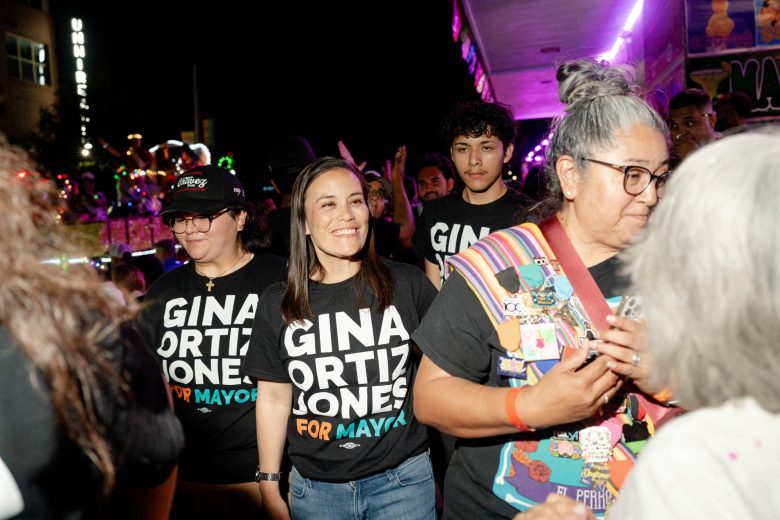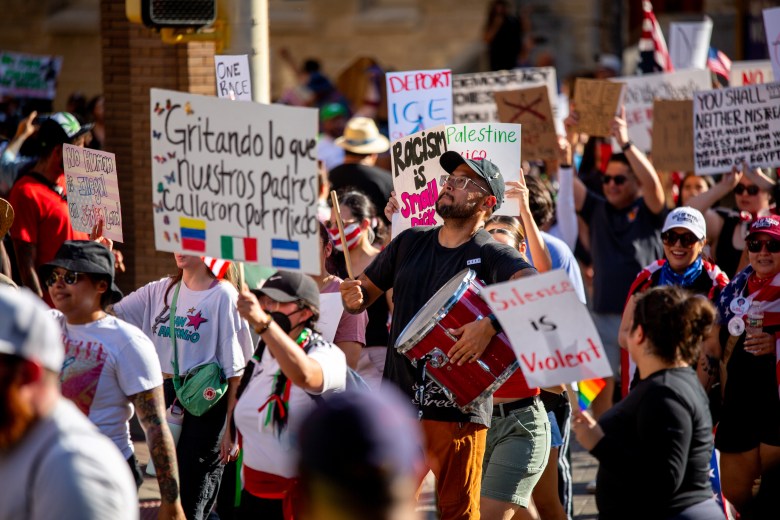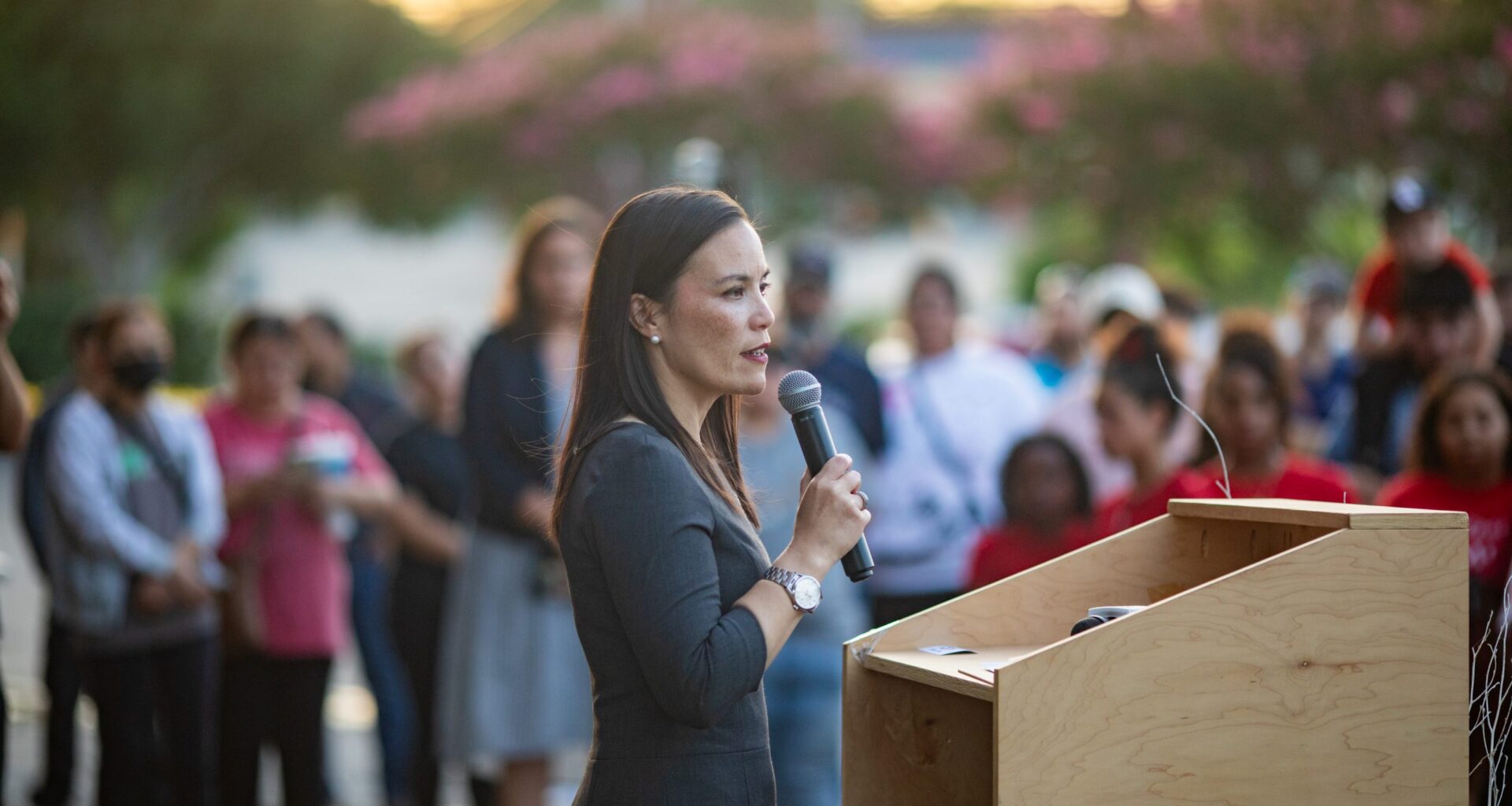A focus on more front-of-mind federal issues, a clear Democratic resume and, at times, a willingness to criticize current city leadership all helped Gina Ortiz Jones stand out from the pack in San Antonio’s 27-candidate mayoral race.
Now as she takes office — at the same time San Antonio ushers in one of the most partisan councils in recent memory — Jones is rapidly working to prove she can be a mayor for more than just her progressive supporters.
Jones finished more than 8 percentage points ahead of runoff opponent Rolando Pablos, a business attorney who had the backing of deep-pocketed business leaders and many political insiders he’d worked with in the past.
In the weeks since then she’s been mending fences: attending the Greater San Antonio Chamber of Commerce’s investor meeting, appearing publicly with former Mayor Ron Nirenberg and even giving shoutouts to council conservatives’ top policy priorities in her inaugural address.
“Whether you voted for me, or didn’t vote for me, or didn’t vote, this council up here is committed to making sure you have the best possible opportunity to live your best possible life here in the greatest city,” Jones said in her speech Wednesday.
She takes office as San Antonio progressives, fired up over the first months of President Donald Trump’s return to office, say they want to see local leaders continue fighting conservatives at all levels of government.
They elected a number of like-minded candidates in the 2025 San Antonio city election and have been protesting over ICE deportations and other GOP policies that local leaders have little power to influence.
 Gina Ortiz Jones attends the Flambeau parade with her staff after securing the highest number of votes on May 3 to make the runoff election. Credit: Brenda Bazán / San Antonio Report
Gina Ortiz Jones attends the Flambeau parade with her staff after securing the highest number of votes on May 3 to make the runoff election. Credit: Brenda Bazán / San Antonio Report
“[Jones’ victory was] this massive message that [Gov. Greg] Abbott cannot buy San Antonio, and I hope that that thinking continues for folks over these next four years,” said Ananda Tomas, leader of the progressive Act4SA action fund PAC — one of a large number of progressive groups that spent money on Jones’ behalf.
The San Antonio Report caught up with Jones shortly after the election to talk about the lessons learned from an ugly race, feuds with the city’s political elite and headwinds at the state and federal levels.
It has been lightly edited for clarity and brevity.
SAN ANTONIO REPORT: This was your third high-profile race after two multi-million dollar congressional campaigns that came up short. A mayor’s race is obviously very different from a federal race where the national party has a lot of influence over messaging and ads. Were there major differences in this race that you think led to a different outcome?
GINA ORTIZ JONES: I don’t know that there was. I mean, the messaging is always my own. I say what I want to talk about, certainly in the other races [as well]. It’s a different moment in time.
In a congressional race, you’re not necessarily talking about sports arenas and things like that. But I think what stayed true — and what came across — is my commitment to looking at the data, being objective and pushing back when things aren’t necessarily making sense.
Something isn’t a good idea just because somebody said it is. [I’m asking], “What’s the data that actually supports [an idea like Project Marvel], in light of the history on some of these things?”
I think people also appreciated my willingness to speak about how my own personal experiences in life have brought me to this point and have focused me on all the things that I want to get accomplished. When I talk about serving under Don’t Ask, Don’t Tell, and having the experience of not feeling seen or heard, I think people appreciated that and could see how that experience would shape how I lead.
I have [always] tried to think strategically … but also make sure we were always thinking about the most vulnerable or those that have traditionally been underserved.
SAR: In the runoff we saw a number of political insiders — including ones with left-leaning backgrounds — siding with Rolando Pablos, someone who they don’t necessarily agree with ideologically but believed they’d be able to work with more easily than you.
How do you think they arrived at that conclusion? And now that the race is over, are those critics going to find that they actually can work with you, or is this a new era in city government where insiders will have less power?
GOJ: You’d have to ask them. … I think they’re going to find a person they can work with, and I think they’re going to find a person they enjoy working with.
My approach is going to be based on what any good leader would base their decisions on, which is data, questioning people’s assumptions, and understanding what is, in fact, the logic used to arrive at certain decisions.
At the end of the day, we’re accountable to the people, and the people have to understand what is being done with their resources … and how [those things] are in the interest of serving the people. If we can’t answer those questions, that’s a problem.
So I think they’ll find a good partner in me. They will also find somebody that is going to ask questions that are pretty basic: How does the community benefit? How did we get here? And what does this ultimately mean for our city moving forward?
SAR: Many people will be looking at this race to see what was on voters’ minds just a few months out from a major presidential election. What takeaways would you point to?
GOJ: I don’t know if there was any one thing, [but] I think it is important when we’re a city of our size, and with the challenges we have, that we are cognizant of what is happening at the federal level.
We’re Military City, USA —16% of our population is active duty or veteran. So of course we’re going to talk about the federal cuts to the Department of Veterans Affairs, right? Because when they’re fired, they’re fired right here in San Antonio, and now we have to support those folks that have now lost their jobs, and all the veterans that are now impacted, or their parents are impacted.
So I think we have to be able to walk and chew gum at the same time.
That’ll be important as we’re looking at closing gaps in the [2025 city] budget. It’s not just closing that gap, but it’s also being cognizant of how other changes in our neighbors’ lives are impacting their ability to thrive. What is going to be the impact of those Medicare cuts, Social Security, Medicaid, SNAP? All of those things are going to inform what is the best way to [address the budget deficit].
SAR: You spoke often on the campaign trail about making sure San Antonio cares for its most vulnerable communities. As residents grapple with ICE deportations and a lot of fear surrounding immigration issues — where the city doesn’t have much influence —how do you approach this?
GOJ: I think it’s important that local law enforcement is focused on those things that are actually threats to our community. I do not think local law enforcement should be used as ICE agents. That is taking those officers away from responding to robberies, responding to rapes, responding to actual things that are threatening our community.
I think it’s really important that for federal, state and local leaders, there are clear lines of communication and open lines of communication, so that we’re doing all we can to keep people informed and keep people safe. That would be my priority.
It’s heartbreaking to see what is what is happening. My mom came to this country over 40 years ago from the Philippines chasing the American dream, and so I know what our country represents for so many.
[After watching a video of a mother being deported while her children were in school], I had to think … If this woman was, in fact, the sole provider for that family, what is going to happen to those kids?
That’s my real concern with the approach that’s being taken at the federal level, there seems to be a real disregard for kind of the second- and third-order consequences of these decisions, and they’re impacting families and the most vulnerable.
When families are not sending their kids to school because they’re fearful of who may show up, when people are not showing up to work, when people don’t feel comfortable going to their religious service based on what may happen, … when people are are being preyed upon or being taken advantage of because there is no recourse for them, I think that actually makes all of us less safe.
SAR: Do you envision a more dramatic response from city leaders if the situation worsens?
GOJ: I think that depends on what worse looks like, right? I think as American citizens, we’re all concerned when we read stories about fellow American citizens being deported or not being afforded due process. We’re still a nation of laws, and regardless of where we live in our country, those actions should be concerning, and they certainly are concerning to me.
 Over 4,000 protestors gather June 16 at Travis Park for the “No Kings” protest through downtown San Antonio. Credit: Miranda Rodriguez for the San Antonio Report
Over 4,000 protestors gather June 16 at Travis Park for the “No Kings” protest through downtown San Antonio. Credit: Miranda Rodriguez for the San Antonio Report
SAR: In recent years San Antonio has largely steered clear of kind of large-scale, escalated protest movements that other cities experienced, such as those in the wake of George Floyd’s death in 2020. Do you think that will continue to be the case under more progressive city leadership?
GOJ: People have their First Amendment rights. They can peacefully protest. Obviously, though, people should not engage in crimes or damage property, because there will be consequences as a result of that.
SAR: In this election voters seemed to prefer candidates with more partisan backgrounds, including yourself. Do you think that speaks to the direction city government is headed or what people want from their local leaders in these polarizing times?
GOJ: I think what is going to matter is how what we’re able to get across the finish line, and that is going to be based on how well we can articulate the case as to why this is good for San Antonio.
I don’t ascribe somebody’s current political affiliation to how they might support something moving forward. If we can all show that, “Hey, this is good for San Antonio,” I have faith in City Council members to be able to to look at the data objectively and and frankly, vote in the best interest of San Antonio.
SAR: Do you consider yourself a progressive?
I struggle with that word because people define it every other way. I think myself as somebody that is pragmatic … a leader that is focused on uplifting as many as possible in the course of our actions. I think I’m future-oriented. I think I’m focused on execution.
